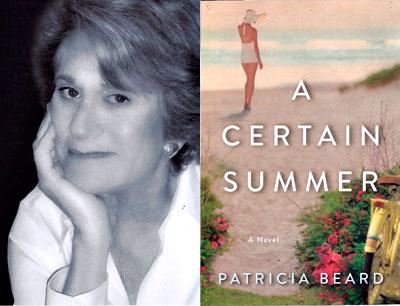Adventures in Neverland

“A Certain Summer”
Patricia Beard
Gallery Books, $16
When a few days of Indian summer appear on the East End this autumn, pick up Patricia Beard’s debut novel, “A Certain Summer,” pack a picnic, and enjoy an afternoon of quiet beach reading.
Both Ms. Beard’s novel and a beach day in early autumn evoke another era — a slower time, a period of different manners and relationships — and both bring the past to life in such a way that a different future seems possible. Equal parts novel of manners, historical fiction, and quiet examination of social mores, “A Certain Summer” weaves important questions about class, gender, trauma, and family through its seemingly simple narrative as artfully as an experienced hostess arranges the seating at a dinner table so that conversations flow among acquaintances as well as friends.
Set in 1948 on Wauregan, an imaginary summer colony on an island off Long Island, “A Certain Summer” offers all of the delights of a beach read — a suspenseful plot, an array of sympathetic characters, and a setting so lovingly rendered that readers may feel they have escaped to the beach even if they are on the Jitney or weathering a northeaster. Nosy readers (such as me) will probably question which of Long Island’s outer islands inspired the novel’s setting. Stumped, my best guess is that Wauregan is a mash-up of Fire Island (because of its proximity to New York City) and Shelter Island (because of its size and aesthetics).
Most of the book is told from the perspective of Helen, whose husband, Arthur, was reported missing amid his work as a spy in World War II. Helen and her son, Jack, still hope for Arthur’s return three years after the war has ended.
The plot revolves around the circumstances surrounding Arthur’s disappearance, especially in relationship to Helen’s status as a married woman whose husband is absent. Not quite a widow, Helen begins to feel desire for other men after seven years apart from her still-beloved husband. While much of the narrative reads like a romance, Ms. Beard bucks the conventions of “they lived happily every after” by multiplying the possibilities available to our heroine and by situating her story in a context that clearly depicts the difficulties of married life as well as the advantages women gained during the war, when they exercised autonomy, freedom, and confidence.
“A Certain Summer” also questions conventions of masculinity, most overtly in its representations of the effects of war on the male characters. Ms. Beard employs a 21st-century understanding of post-traumatic stress disorder yet remains true to the world of the mid-20th century. In this way, she allows readers to see the physical and emotional damage caused both by war and by a world that did not have a complete grasp of this damage.
Initially, I was troubled by the novel’s seemingly one-sided representation of postwar anti-Japanese sentiments, conveyed via the language used by some characters and via the recollections of Peter, one of Helen’s romantic interests, who spends the summer with his grandfather at Wauregan, having returned from service in Japan, where he experienced and witnessed torture. Eventually, Ms. Beard balances Peter’s memories of brutality with his commitment to a new aesthetic, one that he learned to admire in Japan.
Here, as in her depiction of gender roles, Ms. Beard demonstrates an astute sensitivity to cultural politics atypical of the genre of summer fiction: Peter is changed by the violence of Japanese soldiers, and yet his future hopes are rooted in his desire to bring a new “way of living” to the United States, a way of living that he learned about in Japan.
In many ways, the world that Ms. Beard conjures is an adult, albeit inverted, Neverland, where joy is rooted in adherence to rules and customs rather than their dismissal, as in J.M. Barrie’s classic. But Ms. Beard shows that even magical retreats like Wauregan are subject to the vicissitudes of the modern world. In the end, in fact, it seems that Wauregan’s magic prevails in its very ability to change in a way that stays true to its origins, or, even more precisely, that magic prevails as Wauregan learns it must change to stay true to its origins.
Stephanie Wade is assistant professor and director of writing at Unity College in Maine. She spends summers in East Hampton.
Patricia Beard’s previous books include “After the Ball: Gilded Age Secrets, Boardroom Betrayals, and the Party That Ignited the Great Wall Street Scandal of 1905.” She is a summertime resident of Fishers Island.
